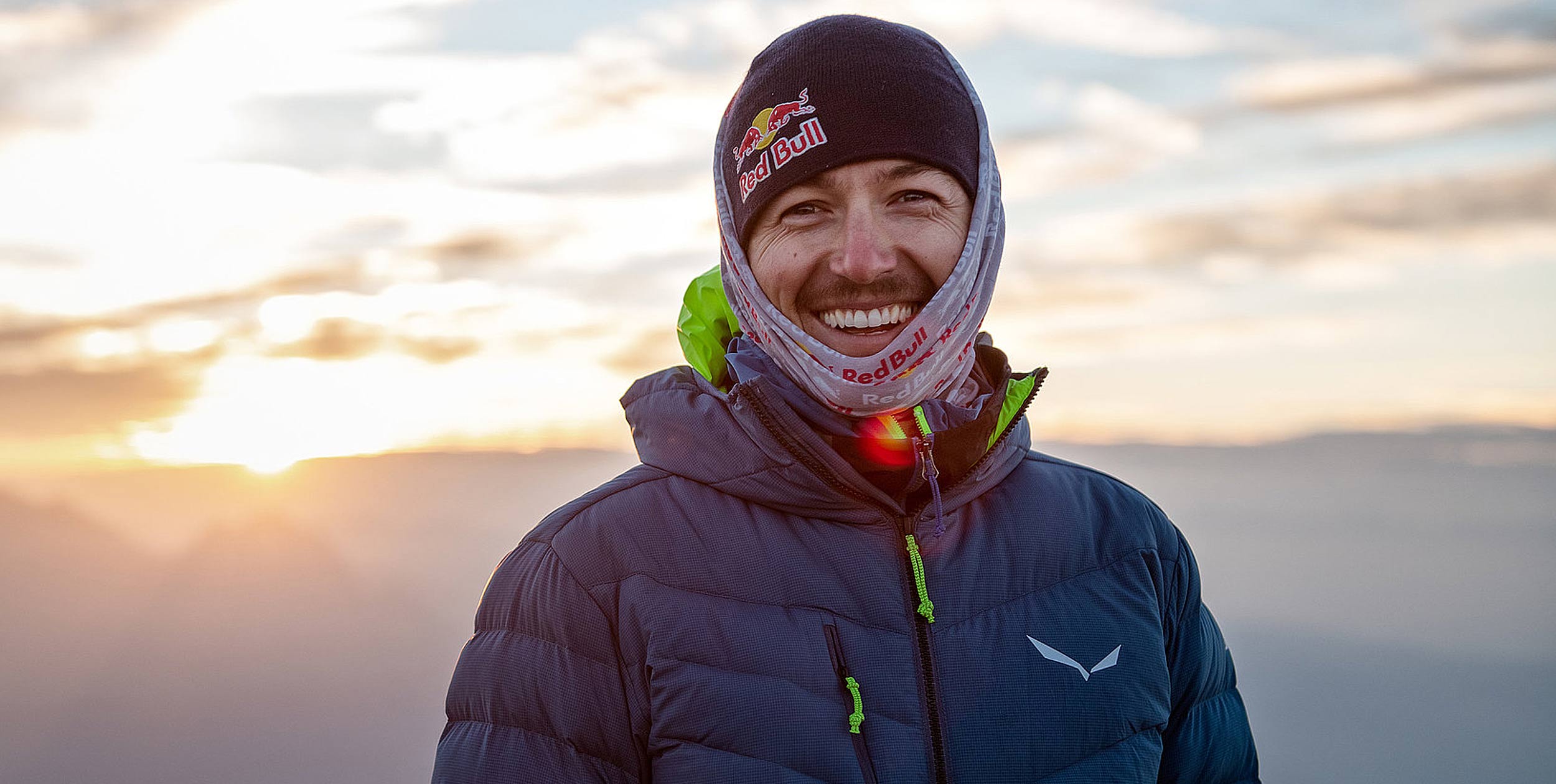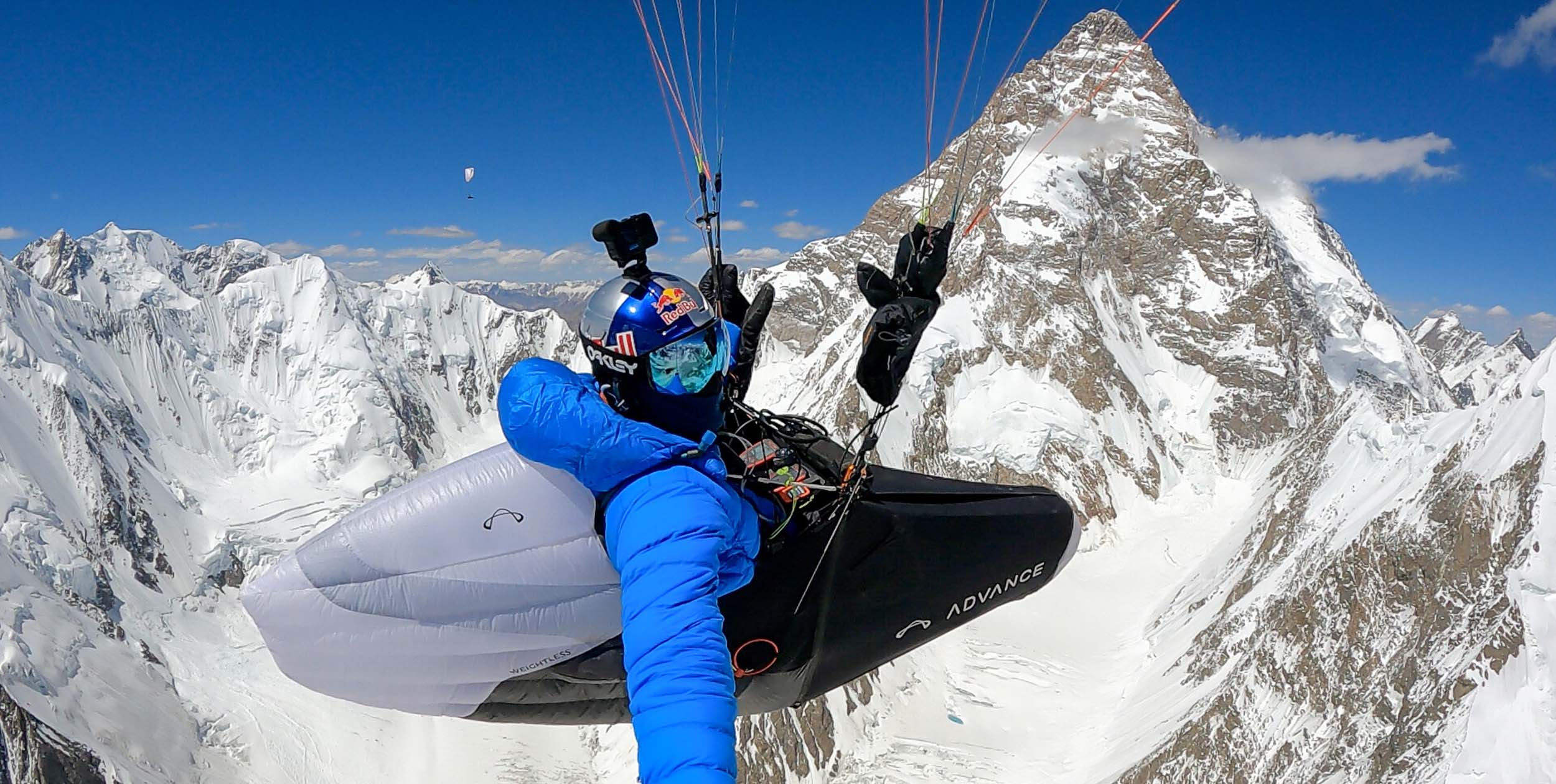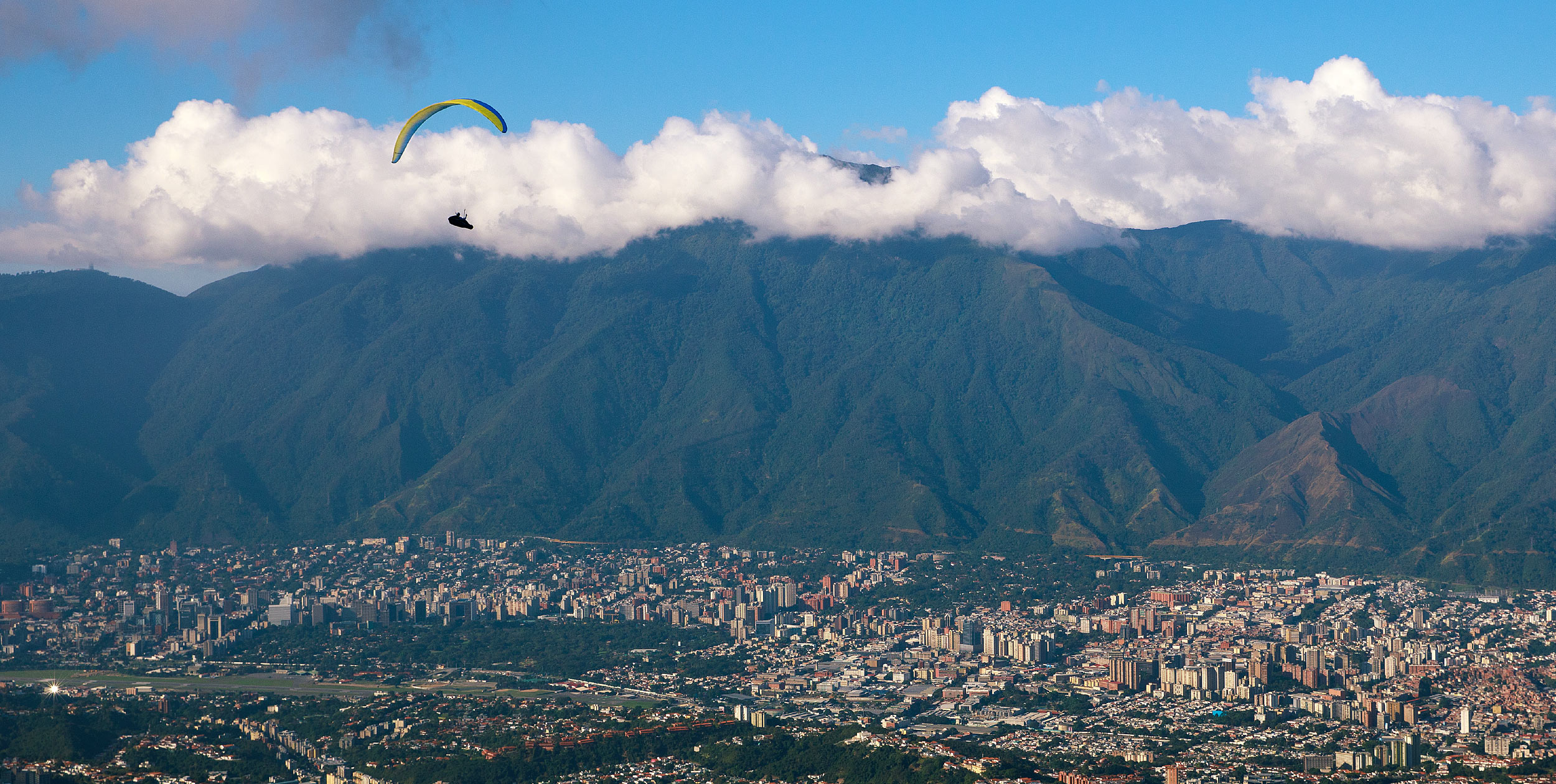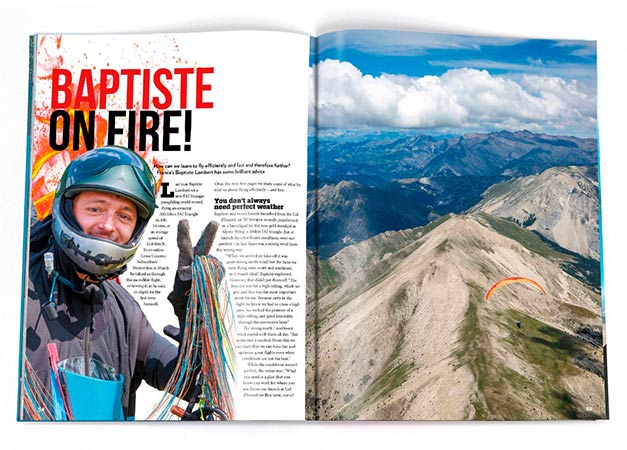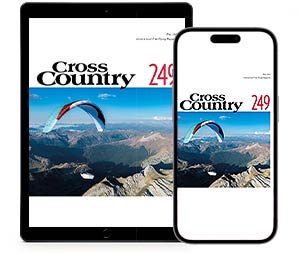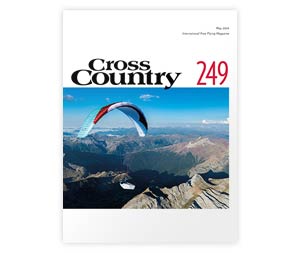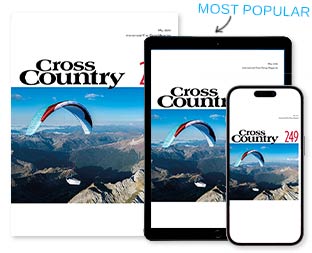We had a great response to our call for pilots to help out with our X-Alps feature in this month’s Cross Country. Some of them went beyond the call of duty, answering questions at length and in detail. We couldn’t fit them all in the magazine, but they do fit online. Thanks to the pilots who contributed – we can’t wait for the 2009 event.
All Photos (C) RedBull Photo Files
Alex Hofer
Swiss pilot Alex Hoffer has won the X-Alps twice.
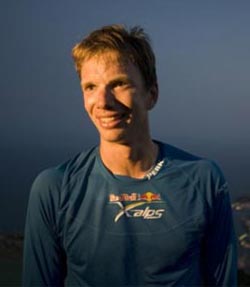 Can I start by asking how you prepare for the X-Alps? Both physically, mentally, and with your equipment?
Can I start by asking how you prepare for the X-Alps? Both physically, mentally, and with your equipment?
Of course I must do some running and hiking training before each X-Alps, otherwise it would be too hard, really no pleasure. Mentally? Well the first time it was hard to be mentally prepared, because it was difficult to imagine what would be coming. Thus, I was nervous and it was making me sick in the beginning. Now I have more experience, and I am well prepared to keep going, even when falling far behind on the last day. Living in China, I am quite far away from the scene now and seriously don’t know much about nowadays equipments. I just trust my great friends at UP who have the right choice for me every time.
What sets you apart from the other competitors? You manage to fly a lot of the race – is that because you are a better pilot, have better ‘luck’ or have different tactics?
I have been flying in the Alps for thousands of kilometers every year for around 10 years, mostly alone on unknown routes. I have experience in alpine flying and winning competitions. It would not make me nervous to be fighting for first place. But some of the others are as good as I am, and maybe next year they are gonna beat me.
If you are leading the race, do you feel under pressure from behind?
No, I try to not get influenced by others during X-Alps.
Looking back at all the X-Alps you have done, were there any points when you thought ‘I can’t go on, I’m going to give up’?
That was during the second day of my first X-Alps, in 2005. I had terrible diarrhoea due to nervousness. I had no power at all and the way to Monaco did not seem do-able. I wanted to find a place to just lie down and sleep but my supporter wouldn’t let me. I walked some detours and Kaspi and Boxi were flying over me even. I fell into a creek and everything was just fucked…
And what was your best memory from the X Alps?
To be running along the slopes of Monaco last year, running one last time, no need to prevent blisters and sour muscles any more. My body was hurting but I was just so thankful for still being fighting for victory, after being far back in the morning. It was nice weather and warm finally, there was the blue sea and a smell of victory, that was awesome!
Tell me a little about your support partner – what is their name, their relationship to you, and how do you choose them?
Originally, it was Heinz Haunschild’s idea to participate in the X-Alps with me. During the race, he was often thinking about things, which I would have forgotten. Once I had to sleep up on 2700m altitude inside my glider in the rain – but at least I had some pasta with me, thanks Heinz! It would have been a bitch to be up there without food… In 2007 he was very engaged with his job, did not do much preparations for the X-Alps and finally did not come at all. I changed for Sandro Schnegg one week before the start. He is a good friend from the early days, he is quite some years younger than me and I knew he would do whatever I say is necessary. They were both very great supporters, otherwise I would surely not have been able to win. Next year Elisabeth Rauchenberger is going to support me, I enjoy when women take care of me and I think she will be the perfect supporter.
What are the perfect qualities to a support partner?
A pilot must do the flying and walking. The perfect supporter is the one who takes care of all the rest.
If a pilot asked for your advice on how to do the X-Alps, what would you say?
For me, the thing that I want to avoid the most, is to be hungry during the race.
And are you going to do it again next year?
Of course
Honza Rejmanek
Honza Rejmanek is a US pilot. He competed in the 2007 X-Alps
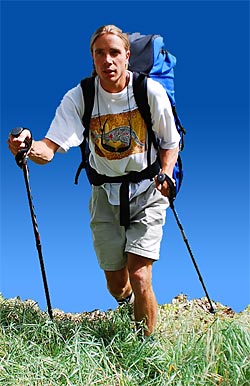 How did you prepare for the X-Alps?
How did you prepare for the X-Alps?
I hiked over 45 vertical kilometers over a course of three months as a part of a field project on a volcano in Chile carrying 20kg-30kg loads on my back. That is what I did right. Eating a sandwich with salami that had soaked up the water from the bottom of a cooler the day before the race started is what I did wrong. Next time I will watch what I eat before and during the race quite carefully.
What was the hardest thing about doing the XAlps?
It was getting terrible food poisoning the day before the race. The lowest point was in the first hour when the uphill started and I threw up all my liquids.
And your highest point?
This was the first flight on day three where I crossed an important high pass and flew 50 km. I was back in the game! I had passed seven people with that flight if I remember correctly.
Had you done anything like it before?
Never anything quite like this. I’ve hiked in the mountains since I was four-years-old and flown in them since I was 17 so this race fit me like a glove. I am used to much stronger flying conditions from the high mountain desert of Sun Valley, Idaho USA so flying the Alps was a treat. Only on the Italy/Switzerland border did I feel that conditions were Sun Valley like. I have always enjoyed side hill landings and have often challenged myself to land or touch-and-go in precarious places. This skill came in very handy in the X-Alps.
What advice would you give to a pilot who wanted to do the X-Alps?
Be very honest with yourself about your flying skills and physical fitness. I wish someone had told me not to eat that sandwich.
Will you do it again?
If my application is accepted I will certainly do it again.
Did you enter thinking you might win it?
No, I am not Swiss.
And finally, how important was your support team?
The support person you chose is half of the success or failure that you will experience during the race. Yes I picked the right person. Dave Hanning was the first to offer and he fought hard to get us in the race. We bickered yes, but we both knew it was best to join forces to get past as many of the contenders as possible rather than to waste energy fighting each other.
Lloyd Penicuik
Australian Lloyd Penicuik, 43, competed in the 2007 X-Alps. He is currently in Papua New Guinea diving for alluvial gold in remote rivers, but plans to return to compete in the 2009 X-Alps
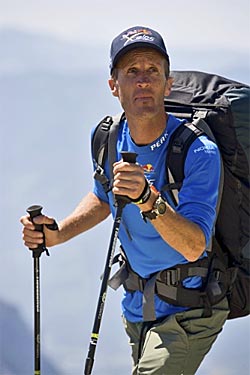 How did you prepare for the XAlps? Both physically, your equipment and your routefinding?
How did you prepare for the XAlps? Both physically, your equipment and your routefinding?
My first step was contacting a friend of mine who is one of the top adventure racers in the world and bled him of all the information I could. I trained on flat ground without a pack to start with. I figured running those distances everyday was going to damage my knees so right from the start I tried to perfect a technique called shuffling.
Once I was comfortable training for two hours every morning I then started training on steep hills, then I started putting a pack on. Towards the last few months I started doing regular treks to get used to carrying a pack for long hours. Mentally, I just kept reminding myself that what one man can do, so can another.
Equipment just came down to money. As I was funding it myself I had little choice but to scrounge what I could. As a result I was probably carrying a few extra kilos than most of the other competitors. Route finding, well I hoped that my supporter was the key to that, as I’d never flown the Alps before.
What are the most important elements to preparation?
To tell you the truth, my preparation wasn’t that good. I will say that after competing I now know that making sure you are compatible with your supporter and that he is as dedicated as you are is critical, especially for the athletes that aren’t familiar with the Alps.
Who was your support partner? What are the most important things to look for in a support partner?
My supporter was a friend and someone I flew socially with. Unfortunately we haven’t spoken since the race. For athletes not familiar with the Alps, your supporter is half your battle. It’s absolutely critical that they know that they are part of the race.
Basically they are going to be your slave for the whole race, you can’t just stop and run off to the supermarket for your own supplies. They are your lifeline, your cook, your driver, your motivator. I can’t express enough, the importance of the supporter. For all athletes, including the ones that know the routes, I’m sure they will agree. Your supporter needs to stay positive at all times and not take anything personally.
Did you have any problems/issues/arguments?
This is one topic I’d rather not go into. Too numerous to mention. I will say that my supporter’s route planning was pretty good.
Describe a typical day on the X-Alps. From waking up, to walking up, to flying, to hiking, to sleeping again.
Now this is a hard question to answer. Making decisions whether to walk up a mountain to fly was probably the hardest judgement to make. Are the conditions good enough to warrant a hard, long slog to a take-off area and possibly only fly a short distance? When to take off is another big one.
Decisions we normally take for granted when free flying or flying in comps aren’t as straightforward when in a race like the X-Alps. You are constantly weighing up all the consequences of all your decisions. How much energy will it take to walk up that mountain? How much ground could I cover if I just kept on running the flats? What time will it be by the time I get there if I do decide to try flying?
What is the worst bit of the X-Alps? When did you feel bottom of the heap?
One of the worst things was if I had long treks where I couldn’t run. It might sound strange but when running your posture is good and the relief on my neck and shoulders was priceless. My trek through the Interlaken valley was probably the hardest. I blew a good day’s flying because I spent three hours trying to launch on a steep slope in light conditions. My glider kept sliding down the hill, the conditions were good to get in the air and around the Eiger but by the time I got airborne I was so frustrated that I blew it and landed at the bottom of the valley that leads to Interlaken.
I landed angry and frustrated and was in no mood to catch up with my supporter, so decided not to hike up another mountain and wait to try the next day at flying around the Eiger. I then proceeded to hike through a tunnel running up the valley. I was nearly through when a police car stopped with two irate policemen who refused to let me keep going.
They took me all the way back and dropped me at the start where I then had to hike the whole way around the valley. I arrived in Interlaken by midday the next day tired and hungry and probably at my lowest. Supporters back in Oz kept sending me text messages to give it another try at flying so I spent five hours trekking up to a launch site only to find I couldn’t launch where I wanted.
I spent a pretty frightening 10 minutes on hands and knees crawling back to the other side of the mountain to launch and land back where I started.
And the best moment?
The best times were when people I didn’t know would come and give directions or walk with me. It’s magic to have people waiting at a town and run along with you and show you the quickest way. The absolute highlight was when on the night before the end of the race some fellow Aussie pilots found me trekking through a town in the rain. They took it in turns to walk with me.
Are you going to do it again?
I must be mad but absolutely. I have a short memory
What advice would you give someone entering the X-Alps 2009?
Choose the right supporter and test them out.
And what secret tips would you keep to yourself?
I think the X-Alps is one of those races where most athletes are completely open to helping each other. Socks made from the right material are important. Knowing how much energy it takes to digest certain foods to how much energy it gives you is also important. I never ate anything heavy if I knew I was going to hike soon afterwards
And what piece of equipment could you not do without, or would take with you?
There isn’t any gear I would or wouldn’t take. I took minimal equipment. Next time I will make sure my gear is tested and harness and glider characteristics match each other and my style
Kari Castle
Kari Castle competed in the 2005 X-Alps. By her own admission she was unprepared and, following knee surgery, wasn’t fit enough. She kept racing but only reached the first turnpoint by the time Alex Hofer was splashing down in the Mediterranean.
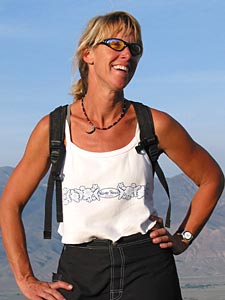 Why did you compete?
Why did you compete?
This race was something I was interested in from the beginning. I loved hiking and flying so why not? I watched the first race with awe and realised this race was out of my league. I remember asking Will Gadd about his experience and afterwards pretty much writing off the idea of ever competing myself.
And then one day towards the end of May 2005 while lying on my couch recovering from knee surgery the day before (!!) I received a phone call from Hannes Arch, the event organiser, calling to ask if I’d be interested in competing in this event. My mind started to spin with excitement and then I had to laugh … yeah right just yesterday I had knee surgery! He said “no worries it’s two months away you’ll be right”. Long story short I agreed to enter in the event without a clue as to how I was going to do it.
And how did you do?
I finished the race. I mean, I didn’t give up. I struggled not to give up every single day.
How did you prepare for it?
I made a huge “To Do” list and plugged away at it. Rehabbing my knee was high on the priority list along with finding the right lightweight gear. I got my hands on maps and tried piecing together the route so I had some idea….this route was scary huge!!!
What fitness training did you do?
Lots of bike riding, hiking up the hill with my pack to fly every chance I had and going to the gym. What should I have done? I needed to train on pavement since so much of the walking was on paved roads. This proved to be a huge mistake on my part not anticipating this. I had the wonderful fantasy of hiking on these wonderful alpine trails up to the most perfect launch with wind dummies flying around showing me what’s going on etc etc….ha ha ha…time to wake up!!
What flying training?
I flew in one competition and concentrated on hiking and hucking (flying) any chance I had in between trying to prepare everything else!
Did you do enough preparation?
Absolutely not! I think you need at least one year to prepare for such a race if you want to be serious about it.
Tell me about your route planning – how did you decide what route to take?
That’s a really funny question because right from the start there were two very different routes that one could take. When you look at it on the map the northern route was so obvious from a direct route standpoint. The southern route took you through the Zillertal Valley which is called the racing valley and was the obvious quick route that added a few kilometers but almost guaranteed to put you ahead of the pack if you hit the weather right.
I wasn’t sure what I was going to do and I thought to myself hey the northern route is so direct, there are mountains…it should work fine. Ha ha ha…so I took the northern route. I had no idea how to get to some of the key launch sites within the first two days when the weather was still ok. Because of this I was forced to walk through these valleys with trees on either side as far as I could see and not knowing what lies ahead or up above….such as a launch. This was so frustrating! And then the weather turned bad and stayed that way for days. All I could see was the road I’m walking on, trees and mountains covered with low laying clouds…ah this is fun!
Tell me a little about the food you ate. What’s good, what’s not good to take?
Red Bull, Cliff Bar shots and bars, dried fruit and nuts. Anything that was easy to carry and eat while walking and walking…did I say walking yet? At night I ate a lot of pasta dishes since it was the easiest thing to prepare and good energy and it was the only thing that sounded good.
Describe a typical day on the XAlps. When would you wake up?
I woke up late compared to the rest of the competitors, around 6am.
How far would you walk or fly?
I ruined my feet on day one so every day after that was torture. So my average distance on any given day was right around 15km-20kms. I had a total of three flights …the first day taking off the Dachstein which was my longest flight of 22kms…after that it was all down hill…I flew on day two by walking way out of my way to get to a launch that if it worked it would save me time.
Instead it cost me big time because the time it took to get there was huge…the launch was marginal to say the least and I only glided 5kms down to a landing in a canyon which forced me to take the high mountain route way out of the way. My third flight was just because…I was walking by a known launch that I could see and I wanted to fly off of it.
The weather was crap at the time so I waited a day and hiked up the next day even though it still looked sketchy. I was just so tired of carrying my wing on the road and wanted to hike up something and fly off. It felt so good to do that even though it didn’t help me get ahead any quicker.
When would you go to bed?
After the daily routine of showering, working on my feet, eating dinner, writing in my journal and daily blogs…somewhere around 11pm.
What is the hardest bit of the XAlps?
For me it was the mental energy it took not to quit every single day. My feet hurt so bad, I was in last place securely, the weather was dismal, I felt lost in the sense of being completely out of my element and kept asking myself why am I doing this? It was a hard question to come up with a good answer on any given day but something kept me going and I’m really glad I did. So there you go! Believe you me it was hard not to quit! I decided to NOT quit because I knew it would feel worse to quit!
How about your partner?
I had no problems for the most part with my support crew. That job as support is equally difficult in its own way. Imagine dealing with athletes in a race like that at any level?? In order to deal with someone like me in last place to the guy in first place one needs to have a lot of patience and understanding. Their job never ends, it goes 24/7 until the end. I would call it a physical and emotional roller coaster.
What tensions were there?
Most of our tensions seem to revolve around navigation issues. It seems as though there was never a detailed enough map for either of us and why weren’t the launches marked???
What would you change looking back?
I would have had more time to prepare and go over to Europe earlier to really scout out the route from start to finish. Flying in the Alps is totally different than any other flying I’ve ever done so I would need time to get used to the conditions there.
How is it different to say, regular competition flying?
It’s hugely different. For many reasons but the one that comes immediately to mind is this. In regular competition you are flying with other pilots along the same course for the most part. In this event you have to rely on your own gut instincts or have local knowledge of any particular site you might launch off of. During the X-Alps I realised I’ve been spoiled by competition in a way.
Think about it, you can rock up to a new site in a new country for the first day of competition and almost always find enough information about the site to feel good about launching off into the unknown. In this race I was forced to go to what looked like a potential launch and figure this stuff out without having anyone to ask if there is anything I need to watch out for.
Granted I didn’t find myself on many launches to begin with but I do remember one day in particular just before the end. I had gone on this huge mountain crossing with local information saying there were no other potential launches past a certain point. I got to this one spot and saw what I thought would be a good launch. It was about 2,000 feet up and out of the way, it looked like the wind would be blowing up it, and there were puffy little clouds above it. It looked perfect. If it worked it would save me this huge walk down off this mountain into the next valley.
I remembered my friend saying there were a lot of trees out in the valley and few landing areas. I kept questioning myself…should I go up and take a look? Then all of these thoughts and concerns ran through my mind like…I’m really tired I’m not sure if I could handle walking down from there if it didn’t work, what happens if it looks good to launch but I can’t see out into the valley to make sure there is a good LZ?
I know I’m supposed to be thinking about going up and flying XC but my survival instincts are stronger than my killer ones! It was so frustrating not to know…not to have someone else flying first if I had any question about the conditions etc. This is why flying in the X-Alps is so different than competition flying for me.
If you had any advice for someone thinking of doing the XAlps, what would it be?
Make sure you really want to do this race. I mean REALLY want to do it and have to skills to survive and not get hurt!
What are the three most important things in the race?
You should be a master at pioneering new sites.
You have to love flying alone and in sketchy conditions
Being prepared and having a great support system in place.
Why do you think you have been one of only two women to compete in the XAlps?
In 2005 there were two of us that started the race and only one of us finished. I’ve talked with a few other women who were interested in competing and I’m really not sure why there haven’t been more entered. To be serious about this race you have to really want it.
I think in general women are not wired for what it might take to win such a race…I may be wrong but I know I was not. I remember asking Will Gadd about the race before hand and this word stuck out the most, he described it as a “torture fest”!! I signed up for a torture fest…yahoo…and I’m glad I did!
Looking back, how do you remember your XAlps?
Did I say torture fest? Actually I will remember it as one of my life’s biggest challenges, physically, emotionally and in my flying career. This was one of the hardest things I’ve ever done by far and I’m very grateful to have had the opportunity to participate and finish.
I will remember it with fondness because of all the wonderful people that helped support me and make it happen. The people I met along the way and the beauty that surrounded me every single day of the event. I will remember this event with some despair because there wasn’t a day that went by that I didn’t have deep feelings of despair. I will remember it with joy because I set out to do something and I did my best every single day. I didn’t quit!
What’s your best memory of doing it?
The finish. When I got word that the leader, Alex, was almost at goal I was never so happy. I had set a goal for myself to make it to the first turn point (the Zugspitze in Germany) at least and I was so close. So knowing I had only 48 hours to make it to MY GOAL and it was within reach was fun and so rewarding once I made it. My wonderful support crew, Craig set up a finish line for me at the 200km mark complete with a chair, a table full of yummy food and ICE COLD BEER!! I thought I had made it to heaven!! To sit and celebrate with my own small victory and the winner’s victory was a dream come true in such a stunning place….all the while reveling in the accomplishment and honour of competing in this amazing race across the Alps. It was even better once it was over!
Aidan Toase
Aidan Toase is a British pilot who has competed twice
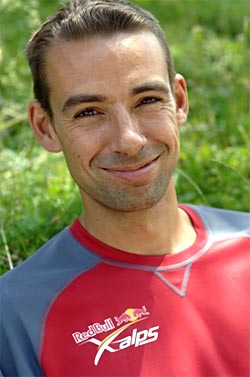 You’ve completed twice. Why?
You’ve completed twice. Why?
Crossing the entire alps with nothing but a paraglider and your own two feet is an incredible challenge and it’s addictive! You learn loads about yourself and your supporter and get a real sense of achievement, I’ve come close enough to Monaco both times, the pull of getting all the way there makes me keep applying.
Tell me how you prepare for this sort of event? What sort of physical training do you do? And from when?
From a physical perspective this is probably the toughest competition around. I can think of no other event which has non-stop running for such a long period of time over such hard terrain. However, most of the competitors are pilots first and athletes second. Tomy’s performance last year demonstrated what you can achieve if you put athleticism first. Covering 140km in just over 24 hrs and coming second overall was down to his physical training. But remember training to be super fit is only half the battle, you need to train to be tough so you can keep going and avoid injuries. There is no rule book on how to train for an event like this, there are no events that are similar.
What’s the most important part of training?
It depends on your own strengths and weaknesses, everyone will benefit from putting in a huge amount of physical training, but that’s unlikely to win you the race alone, you need to be comfortable flying completely alone over unknown terrain and making your own safety decisions. Any preparation you can do on the route is a huge bonus – it is far easier if you are flying over somewhere you know or walking to a take off you know is there.
How do you choose your support? How important are they to you in the race?
It is not quite as simple as choosing your supporter, its probably more the other way around and trying to find someone who is happy to give up their summer holidays and spend the time driving around after you, for no money and not a lot of thanks – it’s a huge ask and it can be really difficult to find someone. The most important thing is that you can get on with your supporter and try to remain conscious of the fact that they have given up a lot to support you.
Describe for me a time when you were at your lowest. When you wanted to give up? How did you get through that and carry on?
Last year, whilst approaching the Eiger, I had incorrect airspace information and landed earlier to avoid airspace (which turned out not to be there!), I then pulled a muscle trying to run up the mountain to re-fly, my leg hurt so much I could only descend steep hills by walking backwards and even walking on the flat was painful, I still had 400km left, a terrible forecast with no chance of a significant flight, and now had loads of competitors catching up behind me whilst Tomy Cocenea* was 40km ahead and running.
Eternal optimism, the drive to find a way to overcome the problem and finally having supporters pushing you on is an enormous help. Anyhow the net effect was I adjusted my tactics walking slowly but nearly continuously, choosing a longer but flatter route which my legs could manage and imagining that my legs were indestructible machines fuelled by Swiss chocolate and it seemed to work.
And tell me about one of the good moments…
I have had so many good moments in the x-Alps, I have done so many flights or walks which I would never have done in any normal situation – and it is simply amazing. Whether cresting a high pass in a wild mountain storm, sleeping rough in your glider, flying at dawn, taking off above the morning clouds, or pushing the limit in the conditions or places in which to fly. The X-Alps is a non-stop catalogue of craziness – I love every minute of it.
How important is winning?
Not important enough for the competitors to loose a strong sense of camaraderie. For me it’s more about overcoming the mountains and getting to Monaco
Does it cost a lot of money? Did you raise money for charity when you did it?
Well it is probably possible to do it on a shoe string, but by the time you’ve paid for several weeks holiday to check out the route, purchased about 1000 maps, got hold of a vehicle, paid for the petrol, got all of the equipment is does add up!! Sponsors are a great help Ozone were fantastically helpful providing great equipment and support and Nokia gave £2000 to my charity Plan International which was very generous.
And what three bits of good advice would you give any pilot considering the XAlps?
Go for it. Get comfortable Alpine Cross Country flying – it’s very different to competition flying or cross country flying in the UK. Go and enjoy some very long mountain walks – The Alps are a beautiful place to walk as well as fly.
Are you doing it next year?
Fingers crossed, yes.
Ruth Jessop
Ruth Jessop was a supporter to Ulric Jessop in the 2007 X-Alps. Together they finished eighth
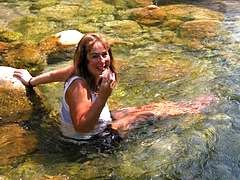 Ruth, you did a lot of research into what sort of food is good for the X-Alps. Tell me about that
Ruth, you did a lot of research into what sort of food is good for the X-Alps. Tell me about that
I think the main thing is to eat a really good variety of nutritious food. Keep off things like cheese that don’t give you anything. Having lots of little meals/snacks throughout the day was very important. Making sure that food was tasty and appetising helped – not just big plates of tasteless pasta or pot noodles.
I used a lot of herbs, spices, dried mushrooms etc to give food flavour and I really tried wherever possible to prepare fresh food – Ulric even had stuffed veal fillets one night.
Is fresh best?
I think people tend to assume on the X-Alps that you will be eating all dried bivvying-out food, but given that most of the time you are walking along main roads through towns you get quite a lot of opportunity to go to shops.
Having said that, I had hoped to use lots of energy-giving green vegetables, fresh chicken and fish but I really struggled to find shops that sold what I wanted. Any shape or size of dried sausage you wanted but not a vegetable in sight was quite often the case! Often you can only get what is in season so I really struggled to get the green vegetables I wanted to go with the meat that I couldn’t get either.
Bread was another problem. Some of the bread, just by looking at it, I could tell that if Ulric ate it he would have no chance of getting airborne! A lot of the bread was really crusty so caused his mouth problems. Trying to plan a snack every hour is pretty difficult when you take bread and hence sandwiches are out of the equation. I had planned to give him lots of fruit but the juice caused his mouth problems too.
I found that cooking up bacon butties for Ulric by the side of the road worked well. Even if he didn’t appreciate them, the delicious smell worked well against his competitors! I even got the camera crew to stand by the side of the road munching away whilst supposedly filming the other competitors!
My theory behind the food was little and often with lots of variety and use fresh ingredients where ever possible. Always have a reserve for when you are going over high passes where there are no shops or for when the whole of Switzerland decides to be shut for the day to commemorate the invention of the cuckoo clock, without warning.
What about superfoods?
Superfoods were gels and energy bars. Towards the end we were both so exhausted that Ulric didn’t really want to eat much and kept going on these, which made me feel like I had failed him.
By the end all I could really get him to have food-wise was Yop. I’m not sure which sends the biggest shiver down my spine even now, seeing a bottle of Yop or a can of Red Bull.
It was difficult towards the end because due to the bad weather, we chose a different route, one that we hadn’t driven before the comp, so I was having to work really hard to find where the paths went, sometimes jogging them to check that they went through, buying maps etc.
There were very few shops going over some of the passes at the end and the only thing I managed to get in Susa was a parking ticket, which had absolutely no nutritional value.
Is there anything not to eat?
Fatty foods that make you feel low after you have eaten them, like cheese sandwiches and fatty steak. We do a lot of walking so experimented with how we felt after eating certain foods and found cheese was the main one that gave us nothing.
Did you count calories?
To be honest we didn’t. I think if you start counting calories and feeling that you have to have this or that, it would just distract from all the other things you need to think about, like constant weather forecasts and having to do a ten minute video diary. Ten minutes doesn’t seem like much, but we always seemed to forget about it until the end of the day so most of our video dairies are footage of us falling asleep.
I just kept trying to get Ulric to eat whenever I could. When I wasn’t walking with him I was preparing food – prawn cocktail, egg mayo, fruit salad etc. There is no point in calorie counting anyway as whatever you do you aren’t going to eat as many calories as you are burning up. The XAlps is not one of those holidays where you need to go on a diet afterwards.
What about drinks?
We were sponsored by High 5 and Maxi muscle both of which Ulric found really good. As much as it pains me to say it, drinking Red Bull is a great way of staying awake. Every second day the runners came round and gave us trays of 24 cans of Redbull, which means that we drank about 100 cans of Red Bull each during the race – no wonder we were both looking pretty scary by the end of it.
How much fluid you need depends on how hot it is and how much you sweat. I always had bottles full of energy drink already mixed up. It was quite difficult to get water in some places so I always tried to keep 9 litres of water (6 bottles containing 1.5 litres each) in the car at all times.
I developed a water fountain fetish – I couldn’t drive past one with out stopping to fill up I was so worried about Ulric not having enough to drink or not having water to cook with. A considerable amount of last year’s BBC budget was spent on filming me filling up empty bottles at animal feeding troughs.
As a supporter, what was your hardest time?
Feeling helpless every day when Ulric took off and didn’t get a good flight and knowing that there is absolutely nothing I could do. Watching somebody that you really care about suffering. Being filmed when I couldn’t find my hairbrush. Being beyond tired. Worrying about the elimination rule. Steve Cox phoning me to say that Ulric hadn’t made it round the Marmalada turn point. Washing my hair in a cow trough and noticing afterwards that it had bits of cow pooh in it. Everytime Ulric landed, knowing that we would then have to spend the rest of the day just trudging endlessly along busy main roads.
Just before Interlaken we spent the night in the back of the car in a horrendous storm, I was oblivious to the storm as I was so tired. The next morning I pulled the awning off, unaware that it was full of water and all the water landed on our mattress. That night we turned the mattress over to try and give us a dry bit to sleep on. I was then draining the potatoes and didn’t realise that I hadn’t put a pan underneath and poured all the water onto the only dry bit of the mattress.
And your best?
Watching Ulric arriving on top of the Dachstein in second or third position and feeling reassured that he could keep up with the others. When you enter the X-Alps it is just such an unknown how you will get on compared to the others. Lying in a bath in a hotel in St Gervais. Finishing 8th and thinking thank goodness I won’t ever have to go through that again.
What advice would you give someone who was thinking of being a support partner for the X-Alps?
Have a really good look at how far it is from Austria to Monaco and how many really big Alps there are in between. Don’t let them convince you that it will be a lovely way to see the Alps. Don’t let them convince you that it will be in anyway romantic. When they try to tell you it never rains in the Alps – they’re lying.
I think the role of supporter could be a very lonely one. For me it wasn’t thanks to the film being made about us. I was very lucky (in some respects) having a BBC film crew with me which made me feel quite safe but otherwise I think the role of a female supporter could be of having to sit in the car a lot of the time as walking along busy main roads early in the morning or late at night just isn’t safe.
I was lucky that I was able to do a lot of the walking especially late at night as the film crew were always either with me or near at hand when I was walking back to meet Ulric. I know popular opinion is that I spent the X-Alps reading Hello magazines in laybys across the Alps. However the reality was that I would generally drive on ahead, check the route, then walk back to Ulric, walk with him to the car, then drive on again. It’s just really, really tough both physically and emotionally and it took me a long time to stop having nightmares about it when we got home.
This article was first published in association with Cross Country magazine, issue 119, October 2008.



